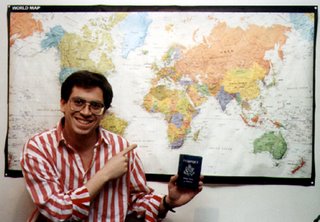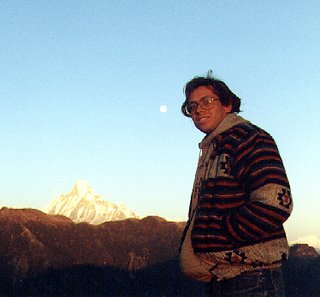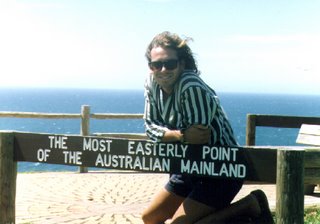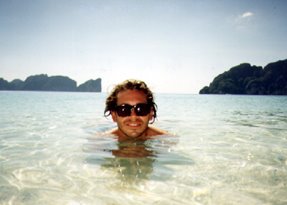 On May 27, 1988, after 2 1/2 years as an associate at a top medical malpractice firm in New York, I quit. Not for another job. But to pick up a backpack and travel around the world.
On May 27, 1988, after 2 1/2 years as an associate at a top medical malpractice firm in New York, I quit. Not for another job. But to pick up a backpack and travel around the world.
And so a journey began, initially lasting 10 months and including my first “blog” of sorts, a monthly travel journal I called The Turkewitz Times. But in actuality the travels lead to my own firm and the newsletter to this little electronic law diary. And it lead to a few lessons in the law, the kind that might not be in our books.
When I quit that job I was already experienced, having deposed over 100 medical professionals and tried two cases at Fuchsberg & Fuchsberg. And because of that experience I was confident I could hook up with a new firm when I returned after having scratched the travel itch. This was an adventure I could never undertake once I got married and had kids, had a mortgage and an assortment of other responsibilities.
 That journey took me from the exotic center of Marrakesh, to the old stone walls of Dubrovnik and Jerusalem, on a felucca down the Nile and to the otherworldly Cappadocia in Turkey. From the depths of Red Sea scuba diving to the Himalayan heights of Nepal. From the poppy fields of the Golden Triangle of Thailand to a final farewell bungee jump in New Zealand.
That journey took me from the exotic center of Marrakesh, to the old stone walls of Dubrovnik and Jerusalem, on a felucca down the Nile and to the otherworldly Cappadocia in Turkey. From the depths of Red Sea scuba diving to the Himalayan heights of Nepal. From the poppy fields of the Golden Triangle of Thailand to a final farewell bungee jump in New Zealand.
I communicated back in ’88-’89 by writing the newsletter filled with stories, a diary, letters, an editorial and an expected itinerary. This would go once a month to my brother Ken, who then typed it all up on a Mac with desktop publishing and mailed my periodical in previously addressed envelopes to 20 family and friends. They, in turn, could write to me (c/o American Express offices) at the anticipated drop points. I would get my own copy of the Times about two to three months after writing it. Much later came email and the the web. So this blog is sort of version 2.0 for me.
 As I morphed from New York trial lawyer to vagabond bohemian, I used almost every travel conveyance known to man, usually in second class, and slept in almost every kind of budget accommodation, often in a state of some discomfort. A couple of random lessons from that trip still pop into my brain when evaluating and trying cases.
As I morphed from New York trial lawyer to vagabond bohemian, I used almost every travel conveyance known to man, usually in second class, and slept in almost every kind of budget accommodation, often in a state of some discomfort. A couple of random lessons from that trip still pop into my brain when evaluating and trying cases.
That’s because you can’t take law in a theoretical vacuum. Jurors can’t be pigeonholed by race or sex, or by any level of economic or social level, though lawyers always try. When people have lived lives, often of spectacular diversity that you can’t even begin to unravel in the few minutes you speak with them in voir dire, you come to realize the difficulties encountered in those few minutes you might have with each person.
And it also means that just because a judge tells jurors that they can do something doesn’t mean they will, because their own life’s experiences will get in the way. The law, for instance, may tell me that I must prove a case by a preponderance of the evidence. Just a smidgen more than 50%. But that doesn’t work for some jurors. If they are going to shift the status quo, most want to see more, even if the judge tells them they don’t need to have it.
 One lesson on the law came to me as I rode the roof of a bus in India. There are times when each of us elects to take our chances to do something or go somewhere, chances that are purely elective. This is the general state of the world, and assessing those risks comes with living a life. And so if you’ve been hurt solely by your own hand due to the risk you’ve undertaken, please don’t call asking for representation to blame someone who is blameless. Even if they have insurance. Because it isn’t just me that won’t be interested, but the jurors won’t be either. Humans are not blank slates and do not magically become so when called for jury service, and most people will be more than a bit resentful if you try to treat them that way.
One lesson on the law came to me as I rode the roof of a bus in India. There are times when each of us elects to take our chances to do something or go somewhere, chances that are purely elective. This is the general state of the world, and assessing those risks comes with living a life. And so if you’ve been hurt solely by your own hand due to the risk you’ve undertaken, please don’t call asking for representation to blame someone who is blameless. Even if they have insurance. Because it isn’t just me that won’t be interested, but the jurors won’t be either. Humans are not blank slates and do not magically become so when called for jury service, and most people will be more than a bit resentful if you try to treat them that way.
Another lesson also came on that same ride, as I watched the conductor climb out the door of the moving bus as we wound through the mountains, use a window frame for a step, and climb up to the roof to collect a few rupees. I came to appreciate the significance of our labor laws.
Other lessons came to me as I realized the significance of my own wealth. I had an American passport and an education. That alone, without more, put me at the top of the heap luck-wise, before even considering that I was able to afford the $2,500 round-the-world ticket that I bought on Pan Am. I was fortunate to have picked my parents well.
And I learned not to sweat the small stuff. So please don’t call me if your injury is small and you will make a full recovery in very short order. The jurors have had small injuries too. It doesn’t mean they brought a suit for a gazillion dollars, the way some folks want to do. Sure you may see such suits in the papers from time to time. But only when the suit is brought, not when it is dismissed later on or settled for a microcosm of the initial demand. Sometimes you just have to count your blessings. Some commenters thought I wasn’t compassionate enough for the guy who claimed to be trapped in the toilet of a JetBlue flight. Now you know why.
 But possibly the biggest travel lesson had nothing to do with the law, or trying to find code violations in this Phi Phi Island hotel you see to the right. (Best two bucks I ever spent. Pants were extra.) And that is that life is short and if you want to do something, then you had better go do it. Sooner rather than later. Traveling will not be easier to arrange five years from now, if that is in your mind. Nor will starting up your own practice.
But possibly the biggest travel lesson had nothing to do with the law, or trying to find code violations in this Phi Phi Island hotel you see to the right. (Best two bucks I ever spent. Pants were extra.) And that is that life is short and if you want to do something, then you had better go do it. Sooner rather than later. Traveling will not be easier to arrange five years from now, if that is in your mind. Nor will starting up your own practice.
When I decided to start my own practice on my return, it wasn’t with any grand plans. I just wasn’t quite sure what I wanted to do next and decided to do some per diem legal work while I mulled it over. And so began the simplest start of any law business: I bought business cards. Then taped one to a white sheet of paper and xeroxed it onto good paper and I had letterhead. I was in business, and answered some ads for lawyers needed for depositions and court conferences, and typed reports on the old Smith Corona. I used this stuff called carbon paper. You can find it in museums.
I went from doing high-end medical malpractice actions prior to travel, to being a rent-a-lawyer that was faxed a few sheets of paper the night before conducting a deposition in the courthouse in a small auto accident case. The firms that hired me, often without even knowing who I was or asking about my experience, were not exactly engaged in the highest form of lawyering. It was a big come-down, but if I was going to take a shot at my own business, starting with rather limited funds, the time to do it was at 29, not 49.
 The business didn’t stay quite that small, of course. I found some medical malpractice cases in some offices that weren’t be worked up (or more likely, they found me), started trying cases with success and arguing a couple of appeals. I got an office, and a computer. I cut off the ponytail I had grown. I’m now in business for myself for 19 years and sitting in my third office location after leaving the home version.
The business didn’t stay quite that small, of course. I found some medical malpractice cases in some offices that weren’t be worked up (or more likely, they found me), started trying cases with success and arguing a couple of appeals. I got an office, and a computer. I cut off the ponytail I had grown. I’m now in business for myself for 19 years and sitting in my third office location after leaving the home version.
I’m not going to claim it was easy. Working for yourself as a small business is a big stress, regardless of the type of business. And the lousy cash flow economics of personal injury law, where you front the case expenses with your own money for years on end, virtually guarantees that growth will be slow. And that assumes you chose your cases wisely and won, and therefore got your disbursements paid back and actually made a fee.

But it has been a fun ride, and I have no regrets. Going out on your own is very much an adventure, in this case one that I stumbled into. But it’s one I’m glad that I undertook. Whether I change again sometime in the future to link up with others is not something I know, only something I am open to. But that is because I try to continue on with an open mind on all sorts of things. You can’t see much when your mind is closed.
Trying new things led to the creation of this blog, without really knowing what, exactly would come of it. Are there risks in writing stuff (or publishing pictures) for anyone to see? Sure. But you also never know where it will lead. (And it may lead nowhere, so I try to make sure I enjoy it, simply for the sake of doing it.)
 It was that open mind that also allowed me to say yes when my five year old said he wanted a mohawk earlier this year. Because hey, I know what it’s like to have once had a full head of hair, and to enjoy it while you can.
It was that open mind that also allowed me to say yes when my five year old said he wanted a mohawk earlier this year. Because hey, I know what it’s like to have once had a full head of hair, and to enjoy it while you can.








